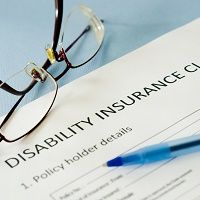Legal vs. Factual Disability: Complications Caused by Disciplinary Action
One hotly contested issue that arises in certain disability cases is when a professional, whether a doctor, dentist, chiropractor, podiatrist, or lawyer, is faced with disciplinary action from the governmental agency charged with overseeing such conduct, and seeks to file a claim for disability benefits.Â

One hotly contested issue that arises in certain disability cases is when a professional, whether a doctor, dentist, chiropractor, podiatrist, or lawyer, is faced with disciplinary action from the governmental agency charged with overseeing such conduct, and seeks to file a claim for disability benefits.
Claimants often have disabling conditions that either have caused them to engage in conduct which subjects them to disciplinary action, or have suffered disabling conditions relating to such conduct. An example may be a doctor addicted to narcotics who is caught taking medication from the hospital, and as a result, is going to be suspended or even lose their license to engage in their profession. Insurers will often seek to deny or terminate benefits to claimants who lose their license to practice their profession, or have disciplinary action taken against their license, even where the disabling condition preceded any action against the professional’s license.
RELATED: More Personal Finance Coverage
· Have a Household Employee? Be Sure to Follow the Tax Rules
· How to Get More Bang for Your Charitable Buck
· You’ve Been Named Executor for your Parents’ Will. Now What?
The issue is characterized by the courts as “legal disability” versus “factual disability.” A legal disability will not permit recovery of disability benefits, while a factual disability will entitle a claimant to recover benefits. A legal disability arises from the situation where the claimant can no longer practice their profession because of the loss of a license, or other disciplinary activity. This is where there is not a disabling medical condition which has pre-dated the license issues. One example might be a situation of billing fraud, which ultimately results in some impact against the dentist’s license. If the dentist were not medically impaired at the time of the licensing issues, it is likely the claim will not be compensable.
In contrast, a factual disability is where the claimant has a disabling condition (whether physical, mental, emotional, addiction) that causes the claimant to become unable to perform the duties of the occupation, and thereafter suffers disciplinary action against the license, often as a direct result of the disabling condition. It is our position that so long as the disabling condition precedes the loss of the license, a claimant should be permitted to recover benefits under his or her policy.
As an example, a dentist who suffers an addiction to drugs may engage in conduct that causes the state agency to investigate and act against their license. However, due to this addiction, the dentist is unable to effectively (and safely) perform the duties of dentistry. That claimant should be considered factually disabled and entitled to benefits, even if the license to practice dentistry in the future is revoked, suspended or otherwise impacted. The important issues relate to the timing of the disability onset, when considered against the timing of the licensing issues.
Jason A. Newfield, Esq., is a founding partner at Frankel & Newfield, a national disability law firm, where he aggressively represents claimants in long term disability insurance, ERISA, and other insurance claims and litigation. He holds an AV® Preeminent Peer Review from Martindale-Hubbell and has been named to the Super Lawyer New York Metro list from 2013 — 2016. Mr. Newfield is frequently invited to speak before bar associations, medical organizations and other trade organizations regarding disability claims and has published numerous articles on Disability Insurance. He is a member of the American Conference Institute, regularly presenting to attorneys and claims personnel at national conferences on disability litigation.
Discover more Dentist’s Money Digest® personal finance coverage here.
ACTIVA BioACTIVE Bulk Flow Marks Pulpdent’s First Major Product Release in 4 Years
December 12th 2024Next-generation bulk-fill dental restorative raises the standard of care for bulk-fill procedures by providing natural remineralization support, while also overcoming current bulk-fill limitations.